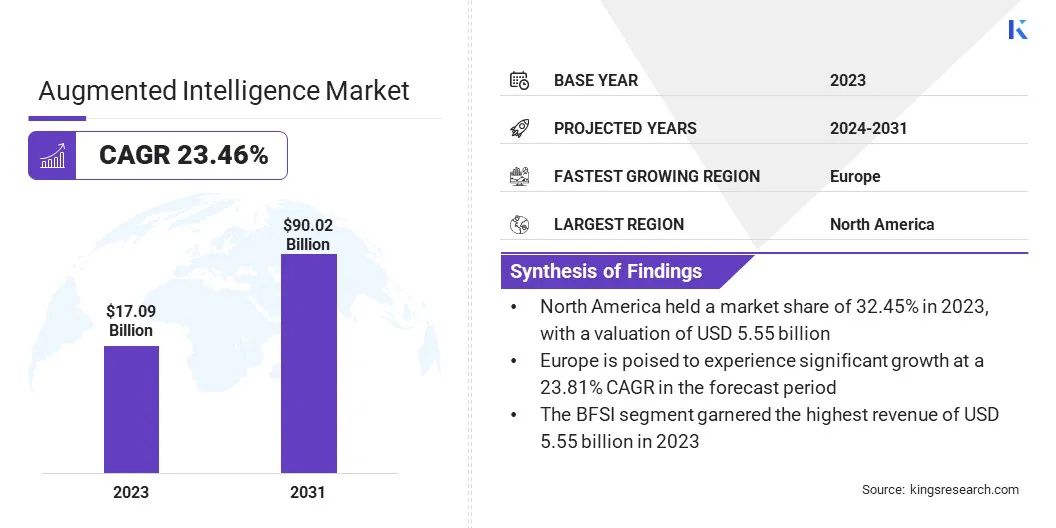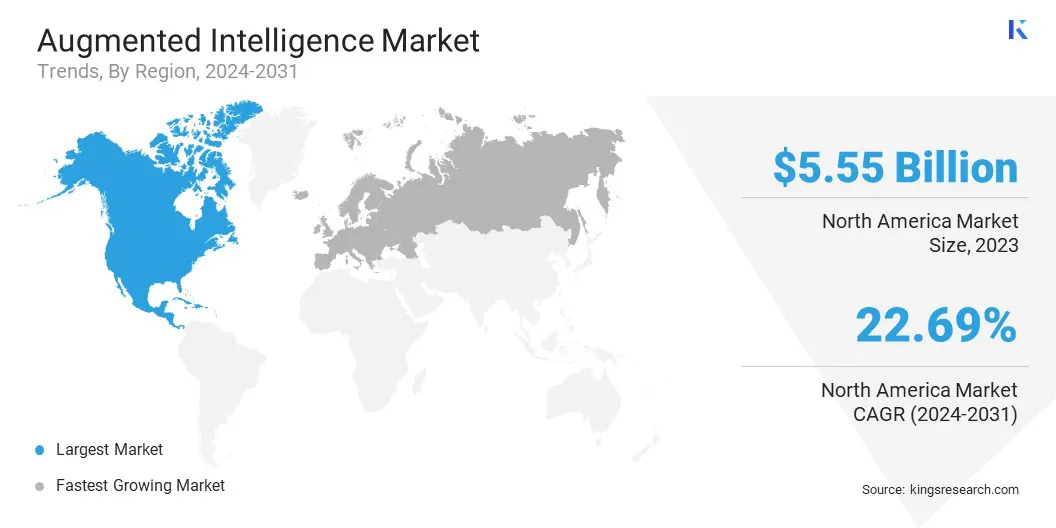Augmented Intelligence Market Size
Global Augmented Intelligence Market size was valued at USD 17.09 billion in 2023, which is estimated to be at USD 20.59 billion in 2024 and projected to reach USD 90.02 billion by 2031, growing at a CAGR of 23.46% from 2024 to 2031.
The expansion of AIaaS (AI as a Service) models represent a significant trend in the augmented intelligence market, offering accessible and scalable AI solutions to businesses of all sizes. AIaaS provides a flexible framework where companies leverage advanced AI capabilities without the need for heavy initial investment in infrastructure or specialized expertise.
This model facilitates the democratization of AI by making it available as a service, typically through cloud-based platforms. This allows organizations to leverage the capabilities of artificial intelligence for various applications, including predictive analytics, natural language processing, and computer vision. In the scope of work, the report includes solutions offered by companies such as Salesforce, Inc., Sisense Ltd., QlikTech International AB, Infor, Microsoft, SAP SE, IBM Corporation, SAS Institute Inc., Jumio, and others.
The expansion of AIaaS is bolstering the adoption of cloud computing. Cloud platforms provide the necessary infrastructure and resources to host AI services, enabling seamless deployment and management of AI models. Additionally, AIaaS models empower businesses to quickly explore various AI functionalities, refine solutions through iterative processes, and adapt to their evolving needs, thereby fostering innovation and enhancing competitiveness in the market.
As organizations seek to leverage the potential of AI without the complexity of developing in-house solutions, the demand for AIaaS is expected to continue to grow, fueling further expansion and evolution of the augmented intelligence market.
Augmented intelligence refers to the relationship between human intelligence and artificial intelligence (AI), where AI technologies enhance human capabilities. In this paradigm, AI systems complement human decision-making processes by providing insights, recommendations, and predictions based on the analysis of vast amounts of data.
Augmented intelligence solutions encompass a wide range of applications and services across various industries. These solutions often include advanced analytics, machine learning algorithms, natural language processing, and computer vision capabilities, among others.
In healthcare, augmented intelligence is revolutionizing patient care through various applications such as diagnostic assistance, personalized treatment recommendations, and remote monitoring. In finance, AI-powered algorithms are used for fraud detection, risk assessment, and algorithmic trading.
Additionally, augmented intelligence is transforming customer service, marketing, and supply chain management across retail, e-commerce, and manufacturing sectors. By integrating AI technologies into human workflows, augmented intelligence enables organizations to make faster, more informed decisions, improve operational efficiency, and capitalize on new opportunities for innovation and growth.

Analyst’s Review
Advancements in artificial intelligence (AI) and increasing adoption of automation are driving the growth of the augmented intelligence market forward. Key players in the market are strategizing to capitalize on these growth factors by focusing on innovation, partnerships, and expansion into new markets. Market leaders are focusing on developing robust AI solutions that address specific industry challenges while ensuring transparency and ethical use of data.
Another strategy involves forging strategic partnerships with technology providers, industry stakeholders, and research institutions to access complementary expertise, expand product offerings, and accelerate go-to-market initiatives.
Additionally, key players are prioritizing investment in talent acquisition and upskilling to build a skilled workforce capable of fostering innovation and delivering value-added services to customers. As competition intensifies, it becomes increasingly crucial for sustained growth and competitive advantage to differentiate through unique value propositions, a customer-centric approach, and agility in responding to market dynamics.
Augmented Intelligence Market Growth Factors
The emergence of edge computing is revolutionizing the augmented intelligence landscape, enabling real-time decision-making capabilities at the edge of the network. Edge computing involves the processing of data closer to the source of generation, reducing latency and bandwidth requirements. This trend is particularly significant in scenarios where immediate action is required, such as in autonomous vehicles, industrial IoT, and smart cities.
By deploying AI algorithms at the edge, organizations analyze streaming data in real-time, extract actionable insights, and make informed decisions without relying on centralized cloud infrastructure.
Additionally, edge computing enhances data privacy and security by minimizing data transfer over the network and keeping sensitive information local. Furthermore, the proliferation of edge devices and the advancement of edge computing platforms are fostering innovation in augmented intelligence applications, empowering businesses to leverage AI-driven insights for enhanced operational efficiency and improved customer experiences.
High implementation costs and integration challenges pose significant barriers to the widespread adoption of augmented intelligence solutions. Industry players are employing several strategic approaches by investing in the development of more cost-effective and user-friendly AI solutions that streamline implementation processes and reduce upfront expenses to mitigate these challenges.
By offering scalable and modular AI platforms, vendors enable organizations to start on a small scale and gradually expand their AI initiatives, thus demonstrating value and return on investment. Additionally, strategic partnerships and collaborations between technology providers, system integrators, and industry experts facilitate smoother integration of AI solutions with existing IT infrastructure and workflows.
These partnerships often involve the sharing of resources, expertise, and best practices, thereby accelerating deployment timelines and reducing implementation risks. Furthermore, some industry players are exploring alternative deployment models, such as AI as a Service (AIaaS), which offer flexible pricing structures and offload infrastructure management burdens to third-party providers.
By adopting a combination of cost-effective solutions, strategic partnerships, and innovative deployment models, industry players are effectively addressing high implementation costs and integration challenges.
Augmented Intelligence Market Trends
Enhancing cybersecurity with AI-powered solutions is a significant trend reshaping the augmented intelligence market dynamics, as organizations seek to bolster their defense against evolving cyber threats.
AI algorithms are increasingly being deployed to detect and respond to cybersecurity incidents in real-time, thus improving traditional security measures and strengthening defense mechanisms. These AI-powered solutions leverage machine learning algorithms to analyze vast amounts of data, identify anomalous patterns, and proactively mitigate security risks before they evolve into significant breaches.
Moreover, AI-driven threat intelligence enables organizations to anticipate emerging threats, prioritize security alerts, and automate incident response workflows, thereby enhancing overall cybersecurity posture and resilience. As cyberattacks become more sophisticated and frequent, the demand for AI-powered cybersecurity solutions is expected to surge, leading to increased investment and innovation in this field.
However, ensuring the ethical and responsible use of AI in cybersecurity remains paramount, as biased algorithms or malicious actors could potentially exacerbate security vulnerabilities and undermine trust in AI-powered defense mechanisms.
Segmentation Analysis
The global augmented intelligence market is segmented based on component, deployment, vertical, and geography.
By Component
Based on component, the market is categorized into solution and services. The services segment captured the largest market share of 76.56% in 2023, mainly driven by the increasing demand for consulting, implementation, training, and support services associated with augmented intelligence solutions.
As organizations across various industries adopt augmented intelligence to foster innovation and gain a competitive edge, the need for specialized expertise and support in deploying and managing these complex technologies has surged. Service providers offer a wide range of consulting and implementation services to help organizations assess their AI needs, develop tailored solutions, and integrate them into existing workflows.
Furthermore, training services are essential for upskilling employees and ensuring the effective utilization of augmented intelligence tools and platforms. Additionally, ongoing support and maintenance services are critical for ensuring the smooth operation and optimization of AI systems, thereby supporting the segment uptake.
By Deployment
Based on deployment, the market is divided into cloud-based and on-premises. The on-premises segment is anticipated to witness the highest growth at a CAGR of 25.65% over the forecast period. Organizations in industries with stringent data privacy and compliance requirements, such as healthcare and finance, prefer on-premises deployment to maintain full control over their data and infrastructure.
Additionally, on-premises deployment offers greater customization and flexibility, allowing organizations to tailor augmented intelligence solutions to their specific needs and integrate them seamlessly with existing systems.
Furthermore, advancements in edge computing technologies enable organizations to deploy AI workloads closer to the data source. This reduces latency and bandwidth requirements, thereby increasing the demand for on-premises solutions. Moreover, rising concerns regarding data security and sovereignty contribute to the preference for on-premises deployment, thus fueling the growth of this segment in the market.
By Vertical
Based on vertical, the market is bifurcated into BFSI, IT & telecommunications, retail, healthcare, manufacturing, and others. The BFSI segment garnered the highest revenue of USD 5.55 billion in 2023.
The BFSI sector is highly data-intensive, generating vast amounts of structured and unstructured data, which aims to leverage for insights and decision-making through augmented intelligence solutions. These solutions enable banks, financial institutions, and insurance companies to enhance risk management, fraud detection, customer experience, and regulatory compliance.
Additionally, the BFSI sector is increasingly adopting AI-driven automation to streamline processes, improve operational efficiency, and reduce costs. Moreover, the growing focus on personalized financial services and predictive analytics is leading to the increased demand for augmented intelligence solutions in the BFSI sector.
Augmented Intelligence Market Regional Analysis
Based on region, the global augmented intelligence market is classified into North America, Europe, Asia-Pacific, MEA, and Latin America.

The North America Augmented Intelligence Market share stood around 32.45% in 2023 in the global market, with a valuation of USD 5.55 billion. The presence of major manufacturers, research institutions, and startups is stimulating innovation in augmented intelligence. These organizations have been leading the development of cutting-edge AI technologies and solutions, resulting in widespread adoption across various industries.
Additionally, the region benefits from robust infrastructure and advanced digital ecosystems, which are facilitating the deployment and integration of augmented intelligence solutions. Moreover, favorable government initiatives, supportive regulatory frameworks, and significant investments in AI research and development contribute to the dominance of North America in the augmented intelligence market.
Furthermore, a large customer base across diverse industries such as healthcare, finance, retail, and manufacturing boosts the demand for AI-driven solutions, solidifying North America's position as a key market for augmented intelligence.
Europe is poised to experience significant growth at a 23.81% CAGR in the foreseeable future. European countries have been increasingly prioritizing investments in digital transformation, innovation, and AI technologies to enhance competitiveness and augment economic growth. In response to this, there is a growing ecosystem comprised of startups, research institutions, and technology hubs focused on developing and commercializing augmented intelligence solutions across various industries.
Moreover, collaborations between industry stakeholders, academia, and government bodies are fostering innovation and facilitating knowledge exchange, thus fueling the adoption of augmented intelligence in sectors such as healthcare, manufacturing, and automotive.
Competitive Landscape
The global augmented intelligence market report will provide valuable insight with an emphasis on the fragmented nature of the industry. Prominent players are focusing on several key business strategies such as partnerships, mergers and acquisitions, product innovations, and joint ventures to expand their product portfolio and increase their market shares across different regions.
Companies are implementing impactful strategic initiatives, such as expanding services, investing in research and development (R&D), establishing new service delivery centers, and optimizing their service delivery processes, which are likely to create new opportunities for market growth.
List of Key Companies in Augmented Intelligence Market
- Salesforce, Inc.
- Sisense Ltd.
- QlikTech International AB
- Infor
- Microsoft
- SAP SE
- IBM Corporation
- SAS Institute Inc.
- Jumio
The Global Augmented Intelligence Market is Segmented as:
By Component
By Deployment
By Vertical
- BFSI
- IT & Telecommunications
- Retail
- Healthcare
- Manufacturing
- Others
By Region
- North America
- Europe
- France
- U.K.
- Spain
- Germany
- Italy
- Russia
- Rest of Europe
- Asia-Pacific
- China
- Japan
- India
- South Korea
- Rest of Asia-Pacific
- Middle East & Africa
- GCC
- North Africa
- South Africa
- Rest of Middle East & Africa
- Latin America
- Brazil
- Argentina
- Rest of Latin America


